 Fat Metals strings are made with hand-operated winders, with a Tuned Core Process (TCP) where operators listen to every string as it is made. They are shipped in wood boxes with moisture-sealed packaging to prevent tarnish. Each has a label to identify gauge and alloy. For more, visit professorstring.com.
Fat Metals strings are made with hand-operated winders, with a Tuned Core Process (TCP) where operators listen to every string as it is made. They are shipped in wood boxes with moisture-sealed packaging to prevent tarnish. Each has a label to identify gauge and alloy. For more, visit professorstring.com.
Month: September 2011
-
Fat Metals Strings
-
Akai Analog Custom Shop Issues 10 Pedals
Akai’s Analog Custom Shop line includes 10 guitar pedals: Phase Shifter, Analog Delay, Blues Overdrive, Chorus, Compressor, Drive3 Overdrive, Deluxe Distortion, Flanger, Drive3Fuzz, and Drive3Distortion. See them at analogcustomshop.
-
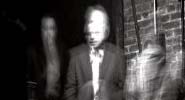
Bill Frisell
Few jazz guitarists combine versatility, originality, and eclecticism like 59-yearold Bill Frisell. He’s such a unique guitar voice, “jazz” seems too confining a category. And thanks to his open-mindedness, he’s as likely to crop up backing Americana artists Chip Taylor and Carrie Rodriguez as he is to collaborate with jazz guitar stalwart Jim Hall – and bring something brilliantly unexpected to both parties.
And when he’s the one throwing the party, the results are equally satisfying – as in this trio outing, backed only by viola (Eyvind Kang) and percussion (Rudy Royston). A glance at the covers – from Benny Goodman’s “Benny’s Bugle” to Little Anthony & The Imperials’ “Goin’ Out Of My Head” to the Stephen Foster title tune – should be enough to make anyone with an adventurous streak RSVP. (Okay, enough with the party lingo.)
The thing is, none of the above sources would find Frisell’s treatments of their material jarring or inappropriate. Neither would the late Vincent Youmans (born in 1898), composer of the evergreen “Tea For Two” – nor would A.P. Carter upon hearing the trio’s updated-Appalachian version of “Keep On The Sunny Side.” And though Blind Willie Johnson’s “Nobody’s Fault But Mine,” which has become a gospel and rock staple, is usually a study in intensity, Frisell’s spare arrangement is thoughtful without getting too cerebral.
Lest any of this sound too cute or like the “fine line between clever and stupid” (to quote Spinal Tap), it’s anything but. Frisell’s own compositions, from the Tin Pan Alley-ish “Sweetie” to the Creamlike “Worried Woman,” reveal the same organic feel of three top-flight musicians bouncing ideas off each other and adjusting their individual and collective paths when warranted. Maybe “jazz” is the most accurate category after all.
This article originally appeared in VG‘s Jan. ’11 issue. All copyrights are by the author and Vintage Guitar magazine. Unauthorized replication or use is strictly prohibited.
-
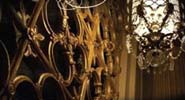
Robert Cray Band
 On the heels of the live release from a 1987 concert, this is a fascinating study that shows how Robert Cray has grown as an artist, working up soul/pop tunes the likes of which simply weren’t in his repertoire 20 years ago.
On the heels of the live release from a 1987 concert, this is a fascinating study that shows how Robert Cray has grown as an artist, working up soul/pop tunes the likes of which simply weren’t in his repertoire 20 years ago.“Our Last Time” is exemplary. A blues, it’s not the standard three-chord tune. Cray’s darting fills and killer chordal work put him in a different place, and the choice of notes in his solo is unique, as is the comping he does behind Jim Pugh’s organ solo. And his vocals are perfect – Cray may well be one of the greatest soul
singers around today.Everything here is more than solid; “Chicken In the Kitchen” has a great lyric, unique changes, and two solos – one almost jazzy, one plain old stompin’ blues. Cray’s bends and the way he plays against the rhythm are as unique as his bell-like tone.
The live DVD in this set matches the CD, and anyone familiar with Cray knows how he and his guitar tend to become a part of each other! This is a perfect set.
This article originally appeared in VG‘s Jan. ’11 issue. All copyrights are by the author and Vintage Guitar magazine. Unauthorized replication or use is strictly prohibited.
-
Team Josie Raises Funds for Cancer society
 Team Josie, an American Cancer Society Relay for Life team sponsored by Vintage Guitar, this year raised $6,500, bringing its four-year total to $32,000. Team Josie was named in memory of Josie Alise Greenwood, who died in April, 2007, after being diagnosed with acute lymphoblastic leukemia (A.L.L.). She was the daughter of VG webmaster Joe Greenwood. The team also conducts a raffle, with this year’s grand prize being a PRS Singlecut SE Korina. The winning draw belonged to Ken Hirvath, Ringoes, New Jersey.
Team Josie, an American Cancer Society Relay for Life team sponsored by Vintage Guitar, this year raised $6,500, bringing its four-year total to $32,000. Team Josie was named in memory of Josie Alise Greenwood, who died in April, 2007, after being diagnosed with acute lymphoblastic leukemia (A.L.L.). She was the daughter of VG webmaster Joe Greenwood. The team also conducts a raffle, with this year’s grand prize being a PRS Singlecut SE Korina. The winning draw belonged to Ken Hirvath, Ringoes, New Jersey. -
Atkins Family Makes Paul Yandell Last “C.G.P.”

Fred Gretsch (left), Paul Yandelll, and Dinah Gretsch. Chet Atkins coined the term “Certified Guitar Player” to describe an artist who personified the ultimate in performance skill and musical quality. Atkins personally bestowed the C.G.P. title on only four guitarists: Tommy Emmanuel, John Knowles, the late Jerry Reed, and Steve Wariner.
In an August 13 program to mark the opening of the “Chet Atkins: Certified Guitar Player” exhibit at the Country Music Hall of Fame & Museum, Atkins’ daughter, Merle, asked Steve Wariner to help her continue her father’s tradition and read a proclamation that officially conferred the final C.G.P. title on Paul Yandell, who had been Atkins’ bandleader and confidant for more than 30 years.
An accomplished player by the time he left high school, Yandell moved from western Kentucky to Nashville in 1955. He began his career with The Louvin Brothers, then played for Kitty Wells and Jerry Reed. He joined Atkins in 1975 and spent 25 years supporting his career.
As a top Nashville session player, Yandell also played on hit records with Atkins, Reed, Dolly Parton, Steve Wariner, Hank Thompson, Perry Como, Roger Whitaker, Les Paul, Woody Herman, The Everly Brothers, and Mary Chapin Carpenter. He also appeared on numerous TV shows.
Following Atkins’ passing in 2001, Yandell released Forever Chet, which featured songs Atkins had performed throughout his career. Yandell’s 2004 Dream Train featured many of his own tunes and was largely performed on the Gretsch Nashville Classic guitar he co-designed. Yandell released In the Groove in 2005 and Drive On in ’06. In ’09, he performed at the ceremony at which Atkins was inducted into the Musicians Hall of Fame in Nashville.
-
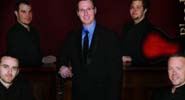
Darrell Webb Band
 Darrell Webb’s career began with a stint with the Lonesome River Band, followed by time in J.D. Crowe’s group. He also played on two of Dolly Parton’s bluegrass albums. In the last several years, he played guitar and sang lead for Michael Cleveland’s band, Flamekeeper.
Darrell Webb’s career began with a stint with the Lonesome River Band, followed by time in J.D. Crowe’s group. He also played on two of Dolly Parton’s bluegrass albums. In the last several years, he played guitar and sang lead for Michael Cleveland’s band, Flamekeeper.In 2009, Webb assembled his own band. With Jeremy Arrowood (bass), Chris Wade (banjo), Asa Gravley (guitar), Jacob Joines (dobro) and Webb on lead vocals, guitar, and mandolin. The band combines youthful energy with professional polish.
Here, we get fully orchestrated version of “Kings of Orebank,” along with 11 other songs. Although Webb is an accomplished songwriter whose work has been recorded by Lou Reid and the Lonesome River Band, others wrote the songs on Bloodline. Highlight covers include “The Kings of Orebank” and a version of Stanley Johnson’s “Big Black Train,” which features fine dobro solos by Tyler Kirkpatrick. The title tune, written by Larry Cordle and Connie Leigh, highlights Webb’s arresting lead vocals and precision mandolin licks. Overall, Webb’s band sounds more like contemporary acts such as Blue Highway than traditional groups like Del McCoury. While not as tightly wound as Flamekeeper or Rhonda Vincent’s groups, Webb’ is tight, tuneful, and worthy of a place in your bluegrass library.
This article originally appeared in VG‘s Jan. ’11 issue. All copyrights are by the author and Vintage Guitar magazine. Unauthorized replication or use is strictly prohibited.
-
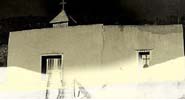
Tom Jones
 A Tom Jones gospel album? The image that first comes to mind is probably something like Elvis’ How Great Thou Art – big production, choirs – and Jones certainly has the lungs to deliver that in spades. But his son/manager, Mark Woodward, obviously had a different idea when he called Ethan Johns to produce.
A Tom Jones gospel album? The image that first comes to mind is probably something like Elvis’ How Great Thou Art – big production, choirs – and Jones certainly has the lungs to deliver that in spades. But his son/manager, Mark Woodward, obviously had a different idea when he called Ethan Johns to produce.The 32-year-old son of famed Glyn Johns (and nephew of Glyn’s brother, Andy), Johns adds U2, Emmylou Harris, Joe Cocker, John Hiatt, CSN, Ryan Adams, Glen Phillips, Counting Crows, the Jayhawks, Ray LaMontagne, Kings Of Leon, Crowded House, and others to the family’s who’s-who resume of credits. But whereas Glyn and Andy are producer/ engineers, Ethan handles those roles in addition to playing guitar, keyboards, drums, bass, mellotron, steel, banjo, Omnichord – just about anything except fiddle.
Anyone who saw director Mike Figgis’ “Red, White & Blues” chapter of Martin Scorsese’s PBS blues series likely had their eyes and ears opened if they thought Jones’ range ended with “What’s New Pussycat?” – as he displayed ample familiarity and ability belting out Howlin’ Wolf and Ray Charles tunes.
Here, Johns takes the Welsh singer back to the basics – not unlike Ry Cooder’s production on Mavis Staples’ We’ll Never Turn Back. The rhythm section (sometimes just Johns playing guitar and kick drum) set up in a circle and played live in the studio – Jones laying down vocals without even using headphones – and were done in 12 days flat.
Instead of copying source materials, they came up with mostly new arrangements – in some cases, barely referencing the old recordings. Hence, the lowdown riff Johns plays on Jessie Mae Hemphill’s “Lord Help” has nothing to do with what the blues singer/guitarist originally played. Likewise, the definition of gospel is flexible enough to accommodate John Lee Hooker’s “Burning Hell” – again, with Johns’ distorted slide riff utterly distinct from the Hook’s version.
It would be sacrilegious (no pun intended) to compare Tom Jones’ version of “Don’t Knock” to Mavis Staples’ reprise of the Staple Singers’ ‘60s standard on her new CD, but, while Staples is more expressive, atop a loping groove, Jones rocks out over Johns’ one-note garage riff.
Johns played a different guitar on virtually every track – a Firebird on “Burning Hell,” a Phantom Teardrop on “Run On,” for instance – mainly through a late-’50s tweed Champ. (Among others, a Tele with a bender and Andy Blake Pickup Wizard pickups, a Harmony archtop, a ’69 Martin D-18, a ’62 Gretsch 6120 Nashville with Filtertrons were also employed – through Premier or Kay reverb tanks.)
In addition to such gospel fare as Blind Willie Johnson’s “Nobody’s Fault But Mine,” Mahalia Jackson’s “Didn’t It Rain” (penned by Roberta Martin), and traditional favorites “Run On” and “Ain’t No Grave” – the liners mistakenly crediting Jones and Johns as writers instead of arrangers – Jones is equally comfortable on the folk/country side of gospel, as evidenced by Dylan’s “What Good Am I?” and Susan Werner’s “Did Trouble Me.”
What direction Jones will take next is anybody’s guess, but after his recent riveting Letterman appearance, one hopes he’ll give this repertoire a nice long run on the road.
This article originally appeared in VG‘s Jan. ’11 issue. All copyrights are by the author and Vintage Guitar magazine. Unauthorized replication or use is strictly prohibited.
-
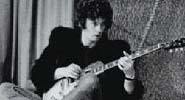
Eric Clapton & Electric Light Orchestra
 It’s become fashionable, especially among younger players, to diss Eric Clapton and write him off as a minor player who stood in Jimi Hendrix’s shadow. Of course, nothing could be further from the truth, and Eric Clapton: The 1960s Review does a solid job of setting the story straight.
It’s become fashionable, especially among younger players, to diss Eric Clapton and write him off as a minor player who stood in Jimi Hendrix’s shadow. Of course, nothing could be further from the truth, and Eric Clapton: The 1960s Review does a solid job of setting the story straight. Slowhand’s early years have been documented many times, but on this DVD we’re treated to new and archival intervews from original Yardbirds Top Topham and Chris Dreja, early bandmates Tom McGuinness and Ben Palmer, Ginger Baker, Jack Bruce, John Mayall and
Clapton himself. You’ll hear how he and his teenage pals formed a cult of blues fanatics in the early ’60s and began hunting down as many import records as they could. Remember, American blues records were exceedingly rare in the U.K.; when Clapton got his hands on one, he would literally wear the grooves off to learn the precious guitar licks.On the debit side, the production values on this DVD aren’t terribly high and there isn’t enough live footage – instead, there are numerous talking heads, which isn’t very exciting to watch. But while it’s not essential, this release does remind us how important Eric Clapton was in the ’60s, and why his role of helping keep the blues alive can never be forgotten or underestimated.
 Electric Light Orchestra is another act that sometimes doesn’t get the respect it deserves – in fact, most of us take it for granted as a slick pop machine of the ’70s. Certainly, its sound was based on the Beatles and Beach Boys, but they added some significant new touches from the classical and prog genres as well. Live: The Early Years captures a college gig from 1973, a German TV performance from 1974, and a full-scale ’76 concert just as they were breaking into the big-time.
Electric Light Orchestra is another act that sometimes doesn’t get the respect it deserves – in fact, most of us take it for granted as a slick pop machine of the ’70s. Certainly, its sound was based on the Beatles and Beach Boys, but they added some significant new touches from the classical and prog genres as well. Live: The Early Years captures a college gig from 1973, a German TV performance from 1974, and a full-scale ’76 concert just as they were breaking into the big-time. Pay particular attention to the evolution of the band behind Lynne. At the ’73 and ’74 shows, the emphasis is more on a proggy sound and the combined impact of violinist Mik Kaminski, a pair of cellists, and the excellent keyboardist Richard Tandy. Cellist Hugh McDowell even liked to pick up his instrument and duck-walk around the stage like Chuck Berry. It’s terrific stuff. In ’76, however, the spotlight has moved to Lynne and co-vocalist/bassist Kelly Groucutt, as well as drummer Bev Bevan, whose pop-star looks were put to use winning new fans (especially since Jeff Lynne was no pinup). The balance of power had clearly shifted from classically-infused rock to hit-making pop.
On guitar, Lynne was no Beck or Page, but he had a few hot rockabilly licks and put them to good use in rockers like “Ma-Ma-Ma Belle” and “Great Balls of Fire.” Plus you can check out
his cool Les Paul goldtop and sweet backline of amps – ELO being a British band, their use of Laneys is not surprising.Live: The Early Years is a revealing look at a ‘70s band that deserves its due.
This article originally appeared in VG‘s Jan. ’11 issue. All copyrights are by the author and Vintage Guitar magazine. Unauthorized replication or use is strictly prohibited.
-
Fano Builds Guitars for Project Blues

The Fano Project Blues PX6 Fano Guitars presented two custom Alt de Facto PX6 guitars to Project Blues, an Ohio-based nonprofit that uses the healing power of blues music to raise funds for cancer patients without financial resources. The organization will hold its First Annual Blues Bash on Sunday, September 11, at the Bluestone, in Columbus. The event features leading blues artists including James Cotton. One custom PX6 will be auctioned off. http://projectblues.org/fano.php.

